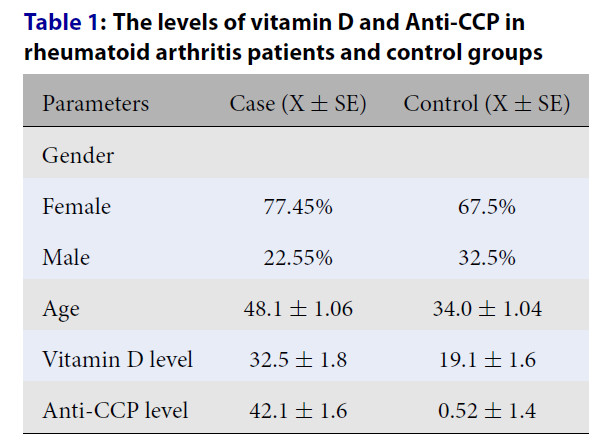Serum Vitamin D and Anti-Cyclic Citrullinated Peptide Levels in Rheumatoid Arthritis Patients
DOI:
https://doi.org/10.15419/bmrat.v9i7.750Keywords:
Anti-cyclic citrullinated peptide, vitamin D, Rheumatoid arthritisAbstract
Background: Rheumatoid arthritis (RA) is long-term autoimmune disorder that primarily affects the joints. Vitamin D has a role in the activity and pathogenesis of RA. The aim of this study is to determine the correlation of vitamin D and anti-cyclic citrullinated peptide (anti-CCP) with disease activity in RA patients.
Methods: A case-control study was conducted between November 2021 and February 2022. A questionnaire was designed to obtain demographic and clinical data from both males and females over 18 years old who did not take vitamin D supplements. A total of 142 blood samples were collected in sterile containers from RA patients. Serum vitamin D and anti-CCP levels from cases and control samples were measured using ELISA.
Results: Of the cases, 77.45% were females and 22.55% were males, whereas 67.5% of the controls were females and 32.5% were males. The average age of the cases and controls was 48.1 +/- 1.06 years and 34.0 +/- 1.04 years, respectively. The level of vitamin D was 32.5 +/- 1.8 in the cases and 19.1 +/- 1.6 in the controls. The level of anti-CCP was 42.1 +/- 1.6 in the cases and 0.52 +/- 1.4 in the controls. Vitamin D deficiency level ratio was 21.7% for the cases and 61% for controls, vitamin D insufficiency ratio was 30.4% for the cases and 18% for controls, and vitamin D sufficiency ratio was 47.9% for the cases and 21% for controls.
Conclusions: There was an inverse negative correlation between vitamin D level and disease activity in RA patients.

Published
Issue
Section
License
Copyright The Author(s) 2017. This article is published with open access by BioMedPress. This article is distributed under the terms of the Creative Commons Attribution License (CC-BY 4.0) which permits any use, distribution, and reproduction in any medium, provided the original author(s) and the source are credited.
